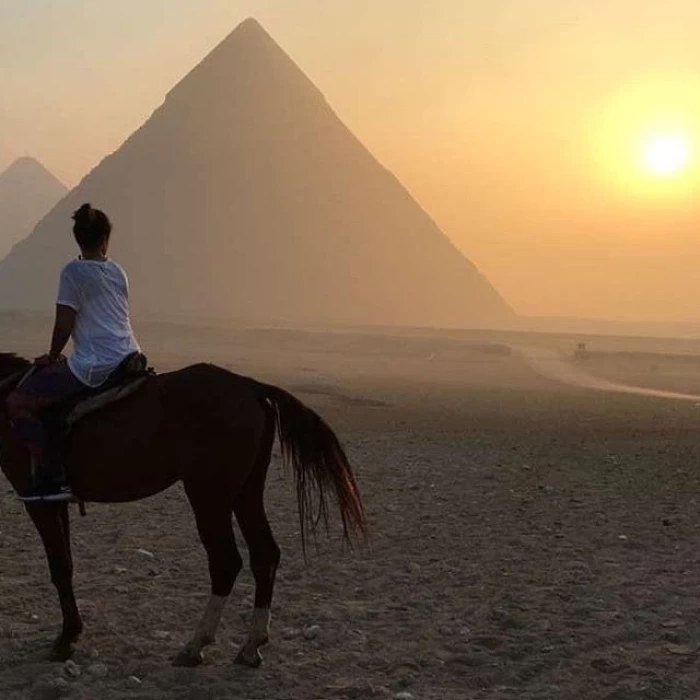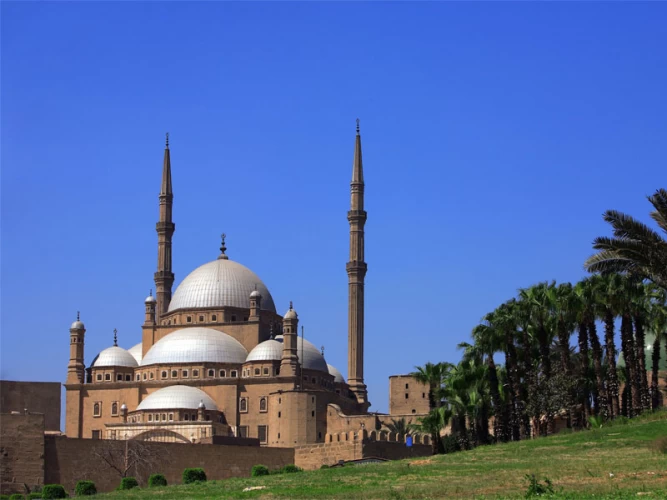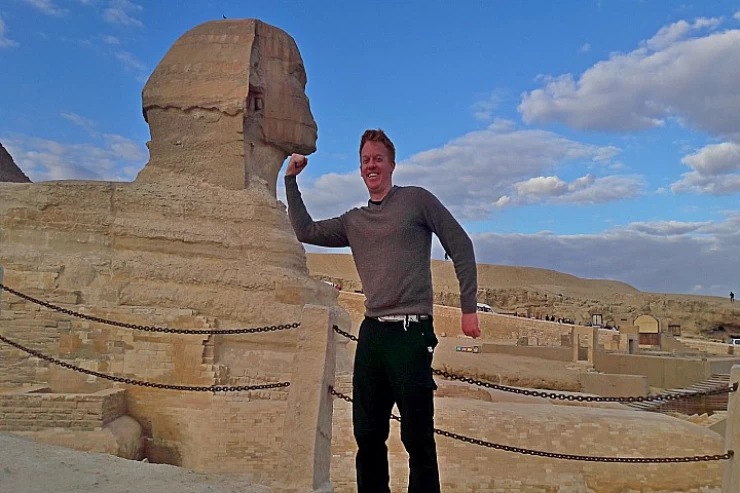
History of ancient Egypt | Timeline of Egyptian history
Due to the rise of the Nile River and its fertile banks and deltas, as well as the achievements and impact of Egypt's indigenous peoples, Egypt's history is replete with great events and major archaeological occurrences. Much of Egypt's ancient history remained a mystery until the discovery of the Rosetta Stone, which helped unlock the secrets of ancient Egyptian hieroglyphs. The Great Pyramid of Giza is one of the Seven Wonders of the Ancient World, and the Library of Alexandria has been the only one of its kind for centuries.
The human foundation in Egypt dates back to at least 6000 B.C. when the Nile River Valley was first inhabited. Ancient Egyptian civilization came together around 3150 BC with the political unification of Upper and Lower Egypt under the first pharaoh of the First Dynasty, Narmer. The original Egyptian domination continued for the most part until the conquest of the Achaemenid Empire in the 6th century BC.
Prehistory (before 3100 B.C.)
There is evidence of petroglyphs along the Nile terraces and in the desert oases. In the 10th century BC, a culture of hunter-gatherers and fishermen was renewed by a grain milling culture. Climatic changes and/or overgrazing around 6000 BC began to dry up Egypt's grazing lands, forming the Sahara. Early tribal peoples migrated to the Nile River, where they formed a settled agricultural economy and a more centralized community.
Around 6000 BC, a Neolithic culture took root in the Nile Valley. During the Neolithic era, several predynastic cultures developed independently in Upper and Lower Egypt. The Badari culture and the successor to the Naqada series are generally considered to be precursors of dynastic Egypt. The oldest known Lower Egyptian site, Merimda, predates the Badarian by about seven hundred years. Contemporary Lower Egyptian communities coexisted with their southern counterparts for over two thousand years, remaining culturally distinct, but maintaining frequent contact through trade. The earliest known evidence of Egyptian hieroglyphic inscriptions appeared during the Predynastic period on pottery vessels from Naqada III, dated to around 3200 BC.
Ancient Egypt (3100-332 B.C.)
King Menes founded a unified kingdom in 3150 BC, leading to a series of dynasties that ruled Egypt for the next three millennia. Egyptian culture flourished during this long period and remained distinctly Egyptian in its religion, arts, language and customs. The first two ruling dynasties of a unified Egypt set the stage for the period of the Old Empire (c. 2700-2200 B.C.), which built many pyramids, most notably the pyramid of Djoser of the Third Dynasty and the pyramids of Giza of the Fourth Dynasty.
The first intermediate period began in a time of political turmoil almost 150 years ago. Stability of government restored the prosperity of the country in the Middle Kingdom in 2040 BC and reached its peak during the reign of Pharaoh Amenemhat III. And with the entry into the second period of separation, with the arrival of the first foreign dynasty in Egypt, the Semitic kingdom of Hexus. The Hyksos invaders occupied most of Lower Egypt around 1650 BC and created a new capital at Alvarez. They were expelled by the Upper Egyptian Force led by Ahmose I, who founded the XVIIIth Dynasty and moved the capital from Memphis to Thebes.
The modern state (circa 1550-1070 B.C.) began with the 18th dynasty, indicating the emergence of Egypt as a world power that expanded during its greatest extent to an empire as far south as Tombus in Nubia, and included parts of the Levant in the east. This period was indicative of some of the most famous pharaohs, including Hatshepsut, Thutmose III, Akhenaton and his wife Nefertiti, and Tutankhamun and Ramses II. The first historically acclaimed expression of monotheism occurred during this period as Athenism, although some consider Athenism a form of monotheism rather than monotheism. Repeated contacts with other countries brought new ideas to the new kingdom. Later, the country was invaded and occupied by Libyans, Libyans and Assyrians, but the indigenous Egyptians eventually drove them out and regained control of their country.
In 332 BC, the Macedonian ruler Alexander the Great conquered Egypt when he overthrew the Achaemenids and established the Hellenistic Ptolemaic kingdom, whose first ruler was one of Alexander's former generals, Ptolemy I Soter. The Ptolemies had to fight native rebellions and were involved in civil and foreign wars that led to the decline of the kingdom and its final annexation by Rome. The death of Cleopatra put an end to Egypt's nominal independence, which resulted in Egypt becoming one of the provinces of the Roman Empire.
Roman rule in Egypt (including Byzantine) lasted from 30 BC to 641 AD, with a brief interlude of control by the Sassanid Empire between 619 and 629, known as Sassanid Egypt. After the Muslim conquest of Egypt, parts of Egypt became provinces of successive caliphates and other Muslim dynasties: Rashidun caliphate (632-661), Umayyad caliphate (661-750), Abbasid caliphate (750-935), Fatimid caliphate (909-1171), Ayyubid sultanate (1171-1260) and Mamluk sultanate (1250-1517). In 1517, the Ottoman Sultan Selim I captured Cairo, absorbing Egypt into the Ottoman Empire.
Egypt remained completely Ottoman until 1867, however during the French control from 1798 to 1801. Inaugurated in 1867, Egypt became a self-sufficient tributary country called Khedifa Misr. But, Khadift Egypt fell under British administration in 1882 following the Anglo-Egyptian war. After the end of World War I and following the Egyptian revolution of 1919, the Kingdom of Egypt was established. While the United Kingdom is a de jure independent state, it retains control over foreign affairs, defense and other matters. British occupation continued until 1954, with the approval of the Anglo-Egyptian in 1954.
With the complete withdrawal of British forces from the Suez Canal in 1956 AD, the modern Republic of Egypt was founded in 1953 AD, the first time in 2500 years that Egypt was fully independent and ruled by the original Egyptians. President Gamal Abdel Nasser (President Ali Egypt from 1956 to 1970) introduced several reforms and established the short-lived United Arab Republic with Syria. His terms also saw the Six-Day War and the creation of the International Non-Aligned Movement. His successor Anwar Sadat (president from 1970 to 1981) changed Egypt's course, moving away from many of Nasiriyah's political and economic principles, reestablishing a multiparty system and launching the policy of economic openness. He led Egypt in the 1973 Yom Kippur War to restore Egypt's Sinai Peninsula, which Israel had occupied since the Six-Day War in 1967. This subsequently led to the peace treaty between Egypt and Israel.
Recent Egyptian history has been dominated by the events that followed nearly thirty years of rule by former President Hosni Mubarak. The 2011 Egyptian revolution overthrew Mubarak and resulted in the first democratically elected president in Egypt's history. Unrest after the 2011 revolution and related disputes led to the 2013 Egyptian coup.
The history of ancient Egypt stretches from the earliest prehistoric settlements in the northern Nile Valley to the Roman conquest in 30 BC. The history of the Pharaonic era dates back to 3200 BC, when Upper and Lower Egypt became a coherent state until the country fell under Greek rule in 332 BC.
the attractions in Egypt can be done during one of the luxury Egypt tours that allows you to stay in the most outstanding hotels and Nile cruises or if you are traveling with a small amount of money and would like to save your time and expenses you can check our wide variety of cheap Egypt travel packages, if you have been in an accident and suffer from a physical injury never worry because our professional operators customized a collection of wheelchair accessible Egypt tours packages using all accessible vehicles and different facilities for disabled people which is one of the main categories of our classic Egypt tours.
A Cairo Top Tours expert, specialized in Egyptology and speaking your language, will assist you wherever you need.
The ancient history that can be perceived from the Pharaohs has to be one of the greatest historical civilizations ever. Its events’ timeline is well over five thousand years, and many aspects of the world, such as art, architecture, culture, and even religion, have their bases in Egypt. The records of the land of Egypt are interesting in that they contain histories of empires that were built and then perished, histories of great kings and queens, and outstanding places and structures that even today, in modern societies, can only marvel at. Egypt’s history is undoubtedly dominated by a vibrant narrative of struggle, hope, and ingenuity of the people portrayed, from the making of the pyramids to the currents of the Nile.
The Ancient Kingdoms of Egypt (c. 3100 BC–332 BC)
1. Pre-Dynastic Period (Before 3100 BC)
The elements of history written of Egypt are dated around 3100 BC, but if one avails of its importance in terms of history, it dates back even to the pre-dynastic era, when there was the emergence of small agricultural settlements along the Nile. By this time, the early residents of Egypt were busy establishing forms of agriculture as well as animal husbandry, pottery making, and the making of crude tools. These settlements served as the foundation of the elaborate systems of culture and society that were to come.
2. The Unification and Early Dynastic Period (c. 3100–2686 BC)
King Narmer, often referred to as Menes was responsible for the unification of Upper and Lower Egypt, which signified the onset of ancient Egyptian civilization. He is considered to be the first pharaoh of Egypt and founded the nation’s first dynasty. This unifying act was essential since it created the nucleus around which the centralized monarchy of Egypt, which was the prevailing system of government for almost three thousand years, would revolve.
Towards the tail end of the Early Dynastic, the very first steps in the construction of monumental architecture began, and hieroglyphs were mastered. It was in this period that the rulers were expected to fulfill the role of the king and also that of a god. This idea existed for many years and was a fundamental one in Egypt.
3. The Old Kingdom (c. 2686–2181 BC)
The divine rulers, who were the Pharaohs in the earthly realm, tamed every resource and manpower to erect huge structures such as the Great Pyramid of Khufu and the Sphinx.
The Old Kingdom period displayed a clear and consistent administrative hierarchy and even a large-scale institutional support system that controlled the resources, agricultural production, and the temples of the state. However, in the latter years of this era, the dominant position of the central authority began to diminish, ushering in an era of chaos and fragmentation.
4. The Middle Kingdom (c. 2055–1650 BC)
Following the tumultuous First Intermediate Period referred to, Egypt returned to political stability and strong rulers in its Middle Kingdom. There is a revival in this period in the fields of art, literature, and monumental building works. Pharaohs such as Mentuhotep 11 and Senusret 111 were responsible for extending Egypt’s boundaries southward into Nubia as well as promoting relations with other countries through trade.
The Middle Kingdom is usually regarded as the classical period of ancient Egypt, filled with relative calm and wealth. The authorities emphasized the development of construction and the growth of the economy of Egypt. In spite of such achievements, the internal conflicts and external challenges finally caused the disintegration of the Middle Kingdom, making way for another period of darkness and despair.
5. The New Kingdom (c. 1550–1070 BC)
The new kingdom constitutes, also from a chronological point of view, the culminating era of ancient Egyptian civilization. It was during this period that Egypt was transformed into a full-fledged empire under rulers such as Thutmose III, Hatusu, and Rameses II, who through wars and conquests, or rather political strategies, expanded Egypt's borders. He also added great temples during this period, such as those at Karnak, Luxor, and Abu Simbel, many of which still exist today.
Il nuovo regno era un’epoca che riformò anche la religione in notevoli modi, come il periodo di regno del faraone Akhenaten, which introduced a period of continuous fight in worshipping a single god—Aten, the disk of the sun. His was, however, an unpopular and a very brief rule, for there were leaders after him who brought back the old ways of worship in Egypt, which was worshiping none but many gods.
But then, power aside, Egypt was not immune to the laws of history. By the close of the New Kingdom, this state institution in question was already wobbly, and there was a gradual abatement of its activities.
1. The Ptolemaic Dynasty (332–30 BC)
For many centuries, the old state of Egypt thrived free until that point in time, which altered when the rule of Alexander the Great started in the year 332 BC. It was also during those years that Alexandria became the center of Greek civilization and education, with the noted Library of Alexandria and the Lighthouse, which is now one of the Seven Wonders of the Ancient World.
Until the end of the dynasty, the traditions of Egypt were largely maintained, even though the rulers were Hellenistic kings. The last ruler of this dynasty, Cleopatra VII, was known to have opposed the domination of Rome by trying to establish relations with Julius Caesar and Mark Antony. However, after her loss at the Battle of Actium in 31 BC, Egypt fell into the Roman Empire.
Under the control of the Romans, Egypt was considered one of the most valuable provinces of the empire, primarily because it was rich and produced plenty of crops, particularly grains. The Romans maintained several of the practices of the Ptolemaic kings; however, Egypt was administered as a colony of the empire. The establishment of Christianity in Egypt started during the Roman times, and it was in the 4th century A.D. that Egypt began to develop into a significant early center of Christianity.
The phase change from the Roman to the Byzantine Empire that occurred in 395 AD marked the slow deterioration of Egypt’s economic well-being, but Egypt was still geographically and religiously active. It was also in this time period that the popular Coptic Church was born, which incorporated aspects of Christianity with ancient Egyptian beliefs.
The Egyptian territories fell to the Army of Islam in the year 642 AD. This marked the commencement of the Islamic Era in Egypt. As Cairo, a city created by the Fatimids in 969 AD, grew prominent, it was clear that Egypt was going to become one of the most pivotal countries in the Islamic world. After most of the Egyptian lands were conquered, Egypt witnessed great prosperity in learning, trade, and the arts.
The Fatimids, Ayyubids, and Mamluks
The capital of Egypt was established, and the famous Al-Azhar University was built during the reign of the Fatimid Dynasty which ruled over Egypt. With the waning of the Fatimid era, Egypt was captured for a brief period by the fact that Saladin, protector of the territories, including Egypt himself, later founded the Ayyubid dynasty, whose main task was fighting against the Crusaders.
Later came the Mamluks, who were a military caste and who ruled over Egypt for several eras. They built a number of the most beautiful structures in the city, including mosques, schools, and fortifications, in the Mamluk period. Egypt was, at least at the stage when it was defeated, a rather big country with advanced development before it was conquered by the Ottoman Empire.
Egypt in the Modern Era (1517–Present)
1. Ottoman and British Rule
With the Ottoman Empire's conquest in 1517, Egypt was annexed as part of the empire for nearly four hundred years and had remained so bound. That is primarily due to its geopolitical possibilities; it was invaded several times by European powers, and in 1798 Napoleon Bonaparte managed to invade Egypt for a short period. After the French lost in this region, Egypt was ruled by Muhammad Ali Pasha, who was on modern Egypt’s compass. He reformed agriculture, industry, and the military; these transformations served as the waking up of the modern state of Egypt.
In the late nineteenth century, Egypt acquired the status of a British protectorate, which lasted until ’52, the year Egypt resumed control after a revolution led by Gamal Abdel Nasser. It was Nasser who became one of the most powerful figures within the Arab sphere of influence, propagating pan-Arabism and earlier nationalizing the Suez Canal in 1956.


















